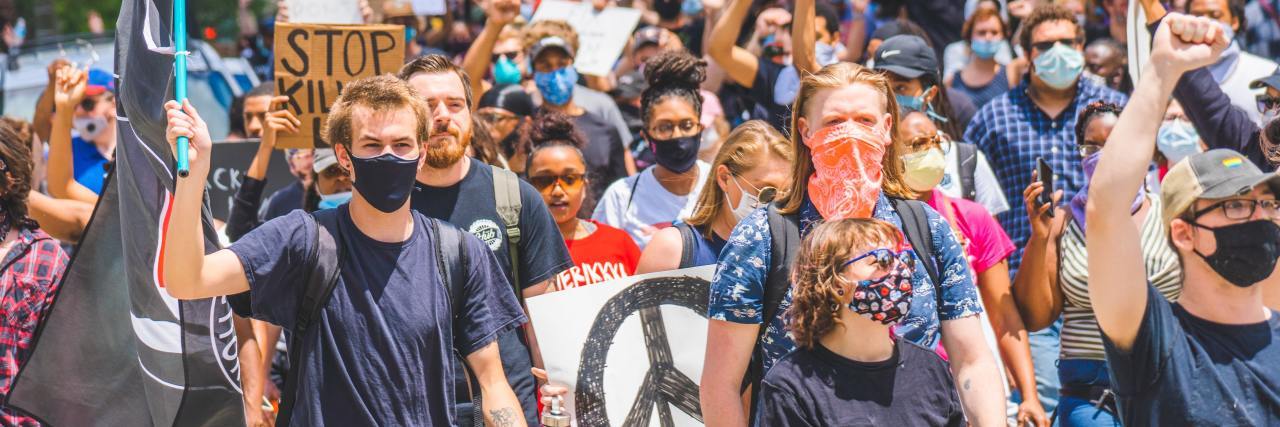The 'Anxiety Guilt' I Have About Not Attending Protests
In the wake of the murder of George Floyd, protests against racial injustice have broken out across the country. Many people from all walks of life have been taking to the streets to march for equality, to end the unfair treatment of Black people in America and, more specifically, to put an end to the police brutality that disproportionately kills Black Americans. Groups of protesters in both big cities and small towns have made signs and yelled chants in gatherings with others who also want to make their voices heard as they demand justice and fair treatment for the Black community.
So what happens when you want to support the movement, but anxiety prevents you from attending protests?
The incredible guilt of not attending protests weighs heavily on me. It’s simply not possible for me. I have severe anxiety and sensory issues. Just the thought of a crowd of loud people is terrifying. It makes me shake in place just to imagine myself surrounded by screaming strangers with very little room to escape. Just watching the protests on TV causes my heart to pound. But the guilt I feel is just as bad as the anxiety that would consume me in the situation.
Am I ambivalent about what’s happening? The answer is no. But then there is the ultimate question that fills me with guilt — what would my grandfather think?
My grandfather was a proud Black man who fought peacefully for equality and justice. He served on the city council, helping introduce policies to put an end to the inequality which was still present in the 60’s — especially in the South where he lived. He worked hard to combat the racism and hatred he faced by always treating others with kindness and respect. So what would he think about the fact that I am staying home and generally avoiding watching the television coverage of these protests? I think I know what his response would be — and it might surprise you.
Though he might not have fully understood what it’s like to have severe anxiety, I do think he would understand there was truly a reason I could not participate in this way. He would encourage me to find other ways to show my support, make my voice heard and educate myself about racial inequality.
The fear in my eyes, my trembling voice, my inability to watch or even hear the TV coverage, it would all be enough. He knew how much I loved him, and how horrified I was by all the things he and the Black community have been through. I do believe he would not want me to feel guilty for having a condition that prevented me from being there. I hope he would understand that a mental illness is not different than any physical condition that might prevent me from being a part of these protests.
However, he would let me know that just because I’m not able to participate in these gatherings, doesn’t mean I can do nothing.
It’s hard to feel like you are “allowing” your mental health to keep you from doing things you want to do. And it is easy for your mind to take you to a place of guilt. That guilt can be so overwhelming, it actually makes it hard for us to see the other valuable ways we can participate and support Black lives.
If your illness prevents you from participating in protests, look for other ways you can get involved.
You might find a charity or organization dedicated to supporting the Black community, and donate or participate in an activity that’s accessible to you.
You could seek out other opportunities to voice your feelings such as signing petitions for change and writing letters or making calls to various political representatives and important leaders.
Of course, a vital part of supporting the need for change is educating yourself. There are a variety of books available not only to help understand the current situation the Black community is facing, but also stories and documentaries of the many ways hatred and racism have influenced our country over the course of history. Finding ways to support Black lives, while also accommodating your condition, is still a valid way to bring positive change into the world.
Mental illness is frustrating both to those who struggle with it, and to those who interact with them. It’s not something we all want to be open about, and as a result we end up in situations where we can’t explain our actions — or our inaction. It’s important to remind yourself that you don’t have to make “excuses'” for why you can’t participate in something that causes you great distress due to your condition. Protesting is only one of the many ways to show support. But if your medical condition prevents you from participating in protests, there are ways to turn the guilt you may feel into action.
Related: 11 Ways to Support Black Lives If You Can’t Go to a Protest

